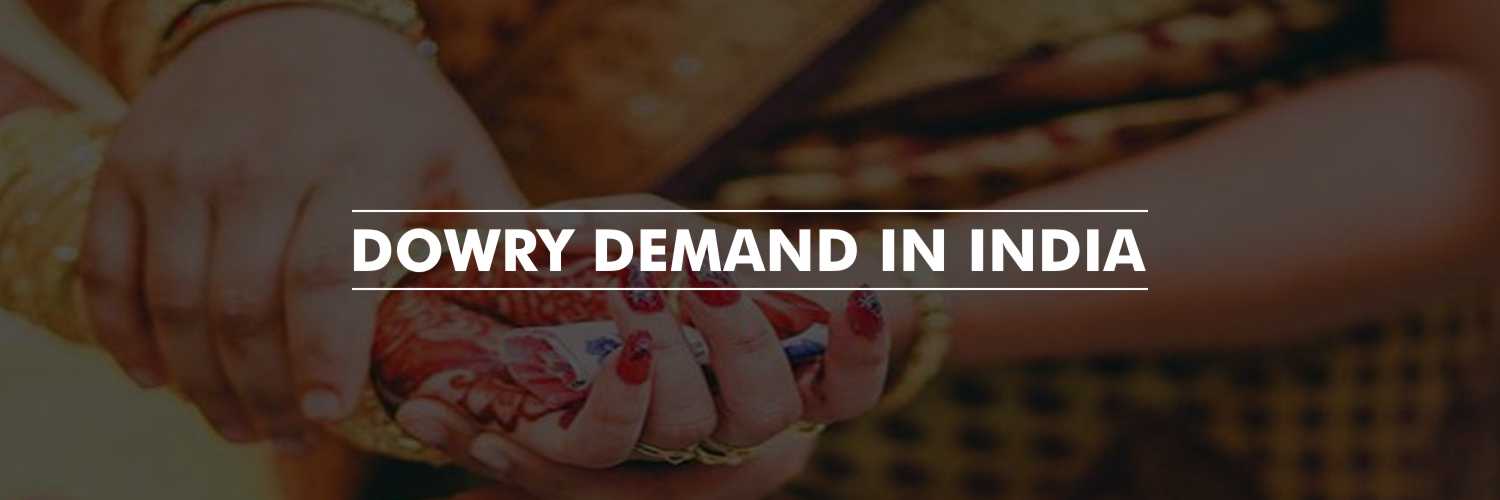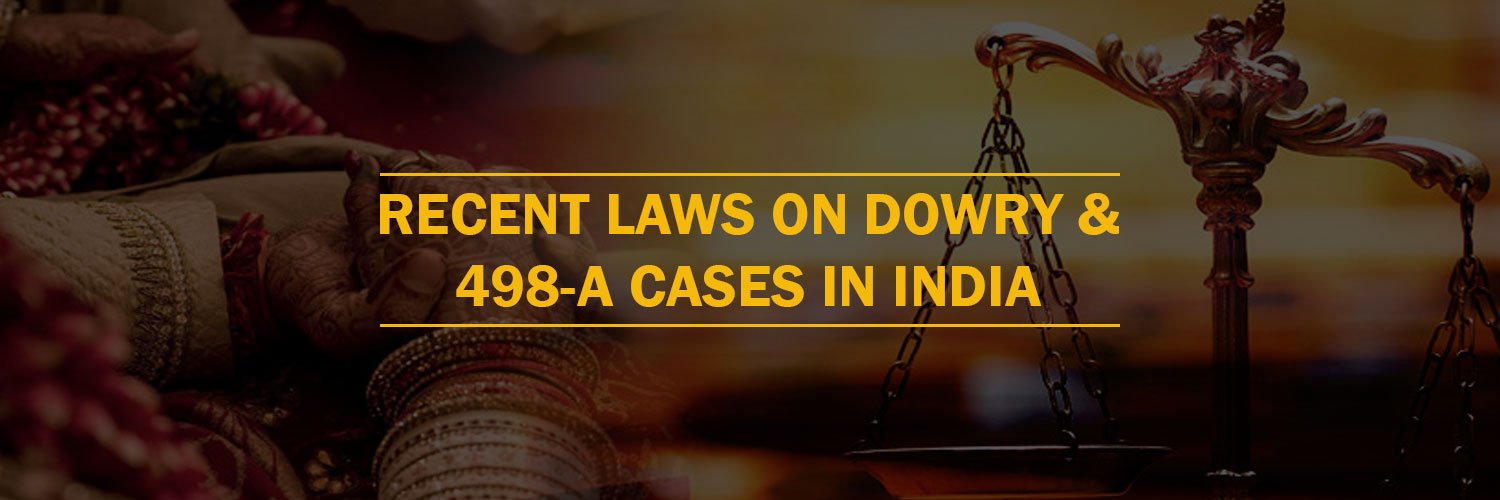Overview
Every single day, 21 women die because of dowry in India.[1] Prolonged socially acceptable customs like dowry have been ratifying the violent and indifferent acts of husbands towards their wives leaving such women vulnerable to domestic violence. To curb the same, various legislations were enacted, and one such law is the Dowry Prohibition Act, 1961. To strengthen the anti-dowry law, provisions of 498-A were inserted with the Criminal Law (Second Amendment) Act, 1983.
Related Acts and Statutes:
- Dowry Death (Section 304 B): “Where the death of a woman is caused by any burns or bodily injury or occurs otherwise than under normal circumstances within seven years of her marriage, and it is shown that soon before her death she was subjected to cruelty or harassment by her husband or any relative of her husband for, or in connection with, any demand for dowry, such death shall be called “dowry death’, and such husband or relative shall be deemed to have caused her death.”
- Section 498A: This section provides that,
Husband or relative of husband of a woman subjecting her to cruelty.—Whoever, Being the husband or the relative of the husband of a woman, subjects such woman to cruelty shall be punished with imprisonment for a term which may extend to three years and shall also be liable to fine.[2]
The explanation of this section defines cruelty as;
(a) any wilful conduct which is of such a nature as is likely to drive the woman to commit suicide or to cause grave injury or danger to life, limb or health (whether mental or physical) of the woman; or
(b) harassment of the woman where such harassment is with a view to coercing her or any person related to her to meet any unlawful demand for any property or valuable security or is on account of failure by her or any person related to her to meet such demand.
Presumption as to dowry death (Section 113 B): “When the question is whether a person has committed the dowry death of a woman and it is shown that soon before her death such woman has been subjected by such person to cruelty or harassment for, or in connection with, any demand for dowry, the Court shall presume that such person had caused the dowry death. Explanation.—For the purposes of this section, “dowry death” shall have the same meaning as in section 304B, of the Indian Penal Code.”
Major Issues
In Dastane v. Dastane,[3] five tests were laid down in determining whether given conduct amounts to legal cruelty which was:
“(i) The alleged acts amounting to cruelty should be proved according to the law of evidence;
(ii) There should be apprehension in the petitioner’s mind of real injury or harm from such conduct;
(iii) The apprehension should be reasonable having regard to the socio-economic and psycho-physical condition of the parties;
(iv) The petitioner should not have taken advantage of his position;
(v) The petitioner should not by his or her conduct have condoned the acts of cruelty.”[4]
In Bhagwat v. Bhagwat,[5] the husband who was not mentally sound tried to strangulate his wife’s brother and his child. It was contended that this could not amount to cruelty as the violence was not directed at the wife. However, the contention was rejected, and his conduct was held to constitute mental cruelty concerning the wife.
In Shobha Rani v. Madhukar Reddy,[6] the court held that constant demands for dowry amount to cruelty.
In ‘Wazir Chand v. the State of Haryana’,[7] the death of newlywed by burning was to be decided by the court. The fact that her father took a large number of articles after her death after her death projected that there existed a pressure being exerted on her regarding more money.
In ‘Inder Raj Malik and others v. Mrs Sumita Malik’,[8] it was contended that Section 498A IPC is ultra vires Article 14 and Article 20 (2) of the Constitution and the existence of Dowry Prohibition Act which also deals with similar types of cases lead to a situation of double jeopardy. But Delhi High Court rejected this contention and held that “this Section does not create a situation for double jeopardy. Section 498-A is distinguishable from Section 4 of the Dowry Prohibition Act because in the latter mere demand of dowry is punishable and the existence of an element of cruelty is not necessary, whereas section 498-A deals with the aggravated form of the offence. It punishes such demands of property or valuable security from the wife or her relatives as are coupled with cruelty to her. Therefore, a person can be prosecuted in respect of both the offences punishable under section 4 of the Dowry Prohibition Act and this section.”[9]
In G.V.N. Kameswara Rao v. G. Jabilli,[10] was held that cruelty must not always be of such nature to cause a reasonable apprehension that it would be injurious to the petitioner and would amount to causing a fear to live with the other party. An act committed with the intention to cause suffering to another party will also amount to cruelty. An isolated event cannot judge cruelty. The social status of the parties may be a relevant consideration.
In Vijaykumar Ramchandra Bhate v. Neela Vijayakumar Bhate,[11] the Supreme Court held that it is not indispensable that cruel conduct should be for a specific duration.
In Dharam Pal v. Pushpa Devi,[12] the Court held that false allegations by a spouse against the other spouse about his/her character amounts to cruelty and may lead to mental anguish and suffering of the other spouse.
Conclusion:
With the increasing number of dowry death and cruelty cases against women cropping up, the need for stringent laws becomes of utmost importance. Though the present laws have provided a framework to protect women against such acts, the fact remains that the conviction rate in these cases remains an abysmal 34.7%. According to the data by Crime and Criminal Tracking Network and Systems, the FIR count under the Dowry Prohibition Act of 1961 was approximately 38, 632 in 2016 and currently, 11,000 cases are being investigated for dowry-related deaths in India. While this is one side of the sad reality, another side is the misuse of these provisions which further aggravate the situation. A time-bound investigation and trial system need to be introduced to provide speedy trial and justice.
Reference
- Dowry-Related Violence Kills Over 20 Women Daily. (2018, March 12). Retrieved from https://feminisminindia.com/2018/03/12/dowry-related-violence-kills-20-daily/
- Section 498A, Indian Penal Code1860
- AIR 1970 Bom. 312.
- Id.
- AIR 1976 Bom. 80.
- AIR 1988 SC 121.
- 1989 SCC(Cr) 105
- 1986 (2) Crimes 435
- Id.
- (2002) 2 SCC 296.
- AIR 2003 SC 2462.
- AIR 2006 P&H 59.







